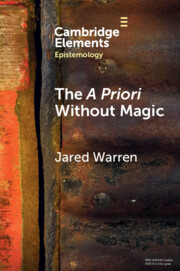11 results
Rigidity and factivity
-
- Journal:
- Episteme , First View
- Published online by Cambridge University Press:
- 27 January 2025, pp. 1-6
-
- Article
-
- You have access
- Open access
- HTML
- Export citation
Analytic Cognition in Kant
-
- Journal:
- Kantian Review / Volume 29 / Issue 3 / September 2024
- Published online by Cambridge University Press:
- 09 September 2024, pp. 467-487
- Print publication:
- September 2024
-
- Article
-
- You have access
- Open access
- HTML
- Export citation
8 - Johann Georg Heinrich Feder
- from Part III - The Reception of the Critique of Practical Reason
-
- Book:
- Kant's <i>Critique of Practical Reason</i>
- Published online:
- 31 January 2025
- Print publication:
- 28 March 2024, pp 199-202
-
- Chapter
- Export citation
Chapter 4 - The Fish Tale: The Unity of Language and the World in Light of TLP 4.014
-
-
- Book:
- Wittgenstein's <I>Tractatus Logico-Philosophicus</I>
- Published online:
- 07 March 2024
- Print publication:
- 14 March 2024, pp 69-89
-
- Chapter
- Export citation
Chapter 3 - Reality
-
- Book:
- Realism for Realistic People
- Published online:
- 08 November 2022
- Print publication:
- 13 October 2022, pp 119-162
-
- Chapter
- Export citation

The A Priori without Magic
-
- Published online:
- 20 September 2022
- Print publication:
- 13 October 2022
-
- Element
- Export citation
Chapter 1 - Introduction: The Spinoza Connection, or the Discovery of “Feeling”
-
- Book:
- Hegel and the Challenge of Spinoza
- Published online:
- 17 September 2021
- Print publication:
- 30 September 2021, pp 1-24
-
- Chapter
- Export citation
THE LOGIC OF SEQUENCE FRAMES
- Part of
-
- Journal:
- The Review of Symbolic Logic / Volume 15 / Issue 1 / March 2022
- Published online by Cambridge University Press:
- 21 July 2020, pp. 101-132
- Print publication:
- March 2022
-
- Article
- Export citation
10 - Arithmetic and the Conditions of Possible Experience
- from Part IV - Arithmetic and Number
-
-
- Book:
- Kant's Philosophy of Mathematics
- Published online:
- 24 April 2020
- Print publication:
- 21 May 2020, pp 231-247
-
- Chapter
- Export citation
9 - Space and Geometry in the B Deduction
- from Part III - Space and Geometry
-
-
- Book:
- Kant's Philosophy of Mathematics
- Published online:
- 24 April 2020
- Print publication:
- 21 May 2020, pp 200-228
-
- Chapter
- Export citation
L'a priori et l'a posteriori en économie
-
- Journal:
- Recherches Économiques de Louvain/ Louvain Economic Review / Volume 73 / Issue 1 / 2007
- Published online by Cambridge University Press:
- 17 August 2016, pp. 5-53
- Print publication:
- 2007
-
- Article
- Export citation

